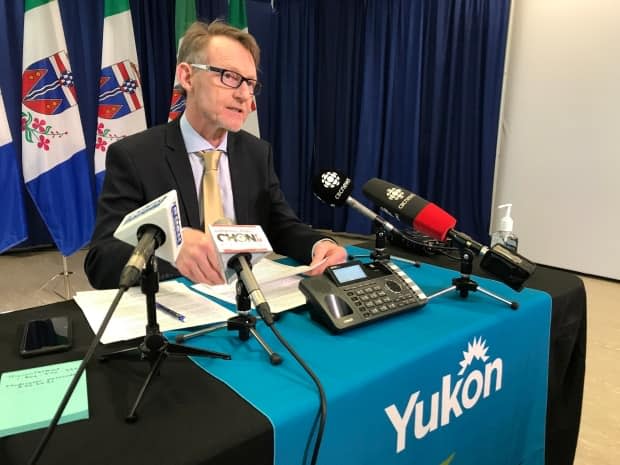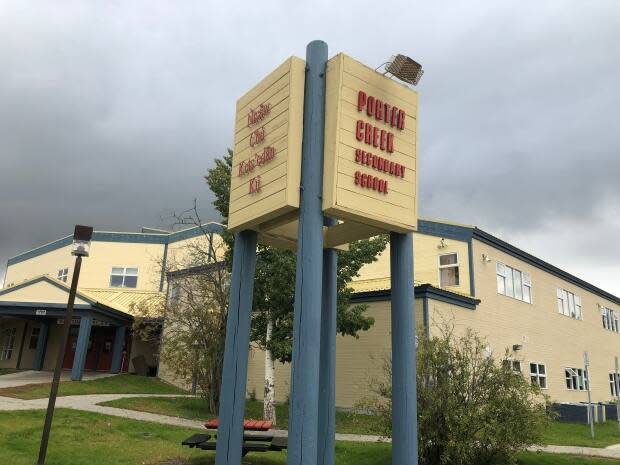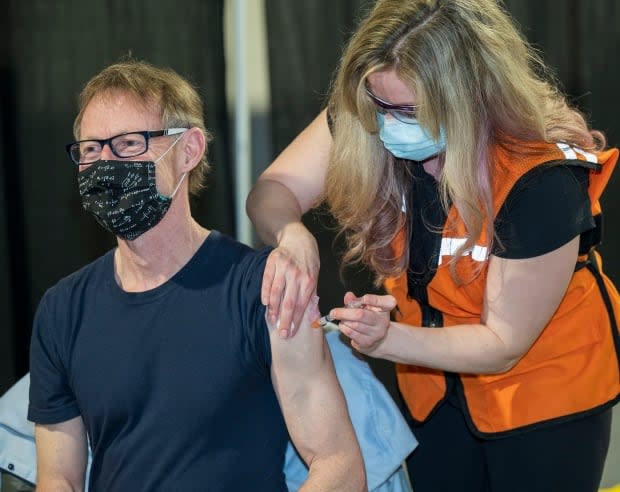Yukon gov't aims to ease COVID-19 restrictions in coming weeks

The Yukon government announced it plans to ease restrictions in coming weeks, if cases of COVID-19 remain low in the territory and residents continue to get vaccinated.
As of Tuesday, there were no active cases of COVID-19 in the territory. There have been 72 cases total in Yukon, with 71 recovered and one death.
Speaking at the territory's weekly COVID-19 update, Premier Sandy Silver announced changes to in-class learning for high school students in Whitehorse, along with allowing larger gatherings in coming weeks.
Some students to return to full-time in-class learning
Silver said Wednesday that Grade 10 to 12 students in Whitehorse will be able to return to full-time in-class learning next month.
This decision was made after conversations with Yukon's Chief Medical Officer of Health Dr. Brendan Hanley and Minister of Education Tracy-Anne McPhee, he said.
"This will involve panning and organization in the coming weeks," Silver said.
Hanley said during Wednesday's update that he is confident the springtime resumption of in-class full-time learning for these students can be done safely.
"Although kids and teachers have adapted well and made the most of a difficult year, I have continued to hear from parents that kids are challenged with the half days," Hanley said.

Hanley said there are contingency plans for online learning, should there be any significant outbreaks of COVID-19 in schools.
He said the territorial government is also working with Yukon University to support the return to in-class learning in September 2021.
The territorial government is also working on guidelines pertaining to summer camps and outdoor sports, Hanley said.
Missed Wednesday's news conference? Watch it here:
Social bubble changes in coming weeks
Silver said as the vaccination rates continue to increase and with the case count remaining low, the territorial government hopes to allow for larger gatherings in coming weeks.
"We know how eager people are to see each other and reconnect after a long and difficult year," Silver said.
Last week, Whitehorse became the first capital city in the country to open up its vaccine clinics to the general population over age 18.
As of Tuesday, the Yukon government says, 15,572 people in the territory have had their first dose of the Moderna vaccine.
The government says the total number of people who have had their second dose, as of Monday, was 8,840 — or about 21 per cent of the total population in the territory.
"Yukon is leading the country in immunizations and it's so great to see the numbers grow every single day. We are growing closer to our target of population immunity," said Silver on Wednesday.

On Friday, the territory released a two-step approach, titled A Path Forward: Next Steps, which looks to strengthen some current public health measures and vaccinate as many people as possible before gradually reducing restrictions.
The strategy outlines what will need to happen before the territory considers changes to self-isolation requirements, expands social bubbles and eases capacity limits inside bars and restaurants.
The plan hinges on the territory's overall vaccination rate, the new case count remaining low, the understanding and impact of the COVID-19 variants, no community spread and ongoing adherence to public health measures.
Hanley said Tuesday that depending on case counts in the territory and across the country, and how COVID-19 variants play out, he is "pretty optimistic" that Yukon can start easing restrictions in the territory by late spring.
B.C. bubble in weeks to come?
Silver said on Wednesday that he is hopeful that if current trends continue, the territory will be able to look at travel bubbles in May and in June.
"What we are able to adjust in the coming weeks and months ... will depend on things continuing upon the same trajectory that we've been seeing recently," Silver said. "But we are cautiously optimistic about what we are seeing."
This includes case counts going down across the country, and vaccination rates increasing both in Yukon and in neighbouring jurisdictions, he said, along with more information on vaccine efficacy on new variants.
Silver said on Wednesday that he has been having conversations with fellow premiers about travel bubbles.
"We all recognize the importance of individuals being able to visit with friends and family, especially as people are immunized and it is safer to do so," said Silver.
"At the same time, we know up here in the territories that mandatory self-isolation has been absolutely critical in keeping us healthy and safe."
In the Northwest Territories legislature on Tuesday, Premier Caroline Cochrane was pressed about the possibility of a travel bubble between Yukon and the N.W.T.
Cochrane said while Premier Silver is "more than interested" in having exemptions, it's complicated.
"Premier Silver has let me know that if he was to consider having an exemption, not a bubble, but an exemption, then he would not be OK with us closing the border when they open up to British Columbia.
"In conversations it will only be in a couple of weeks, he's assuming, before they open up to British Columbia. So at this time, that is the underlying factor that is not good news for us."

